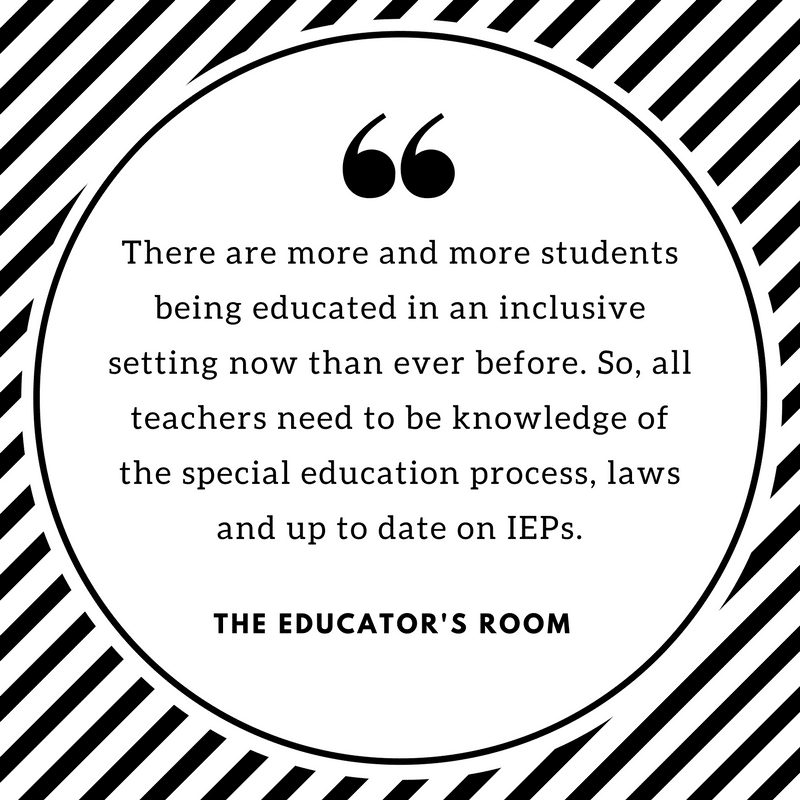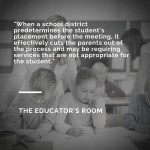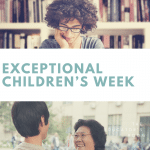There are so many general education teachers who feel hopeless about servicing special education children. Rightfully so, there is just so much to the program to learn, understand and enforce. However, that can’t be an excuse to not make one aware. It’s simply too risky due to the fact that a general education teacher is required by law to follow a student’s IEP. On the flip side, it’s really hard to follow something you don’t understand. Many IEPs can be long and sometimes complicated to understand for the untrained eye.
If a students’ IEP isn’t followed there can be a serious price to pay for the school district. In some cases, teachers themselves have been held personally responsible for not following a student’s IEP. There are more and more students being educated in an inclusive setting now than ever before. So, all teachers need to be knowledge of the special education process, laws and up to date on IEPs.
I recommend reviewing the IEP of each student who will be in your class and taking notes. Focus on the following areas for each student:
- Identify the case manager. This person will be in charge of making sure the IEP is followed and should be working with you closely regarding the student. Ideally, I would like to think this person will seek you out to introduce themselves to you and provide you with certain details regarding the student. However, that is not always the case so be proactive. You will be working with this person for as long as the student is in your class.
- Identify the nature of the disability. Make sure you know the basics of what it means to have this disability and how it will affect the student’s performance in your class. However, don’t allow the information you learn from the file to paint a complete picture of the student before you actually meet them and get to know them.
- Identify the accommodations and modifications. This is important. It is your responsibility to provide the unique accommodations for each student with special needs in your class. Accommodations are supports (for both instruction and assessment) provided to the student in varies classes that do not significantly alter what is being taught. Modifications on the other hand, are actually changes the amount or complexity of information the student is expected to learn or demonstrate during an assignment or assessment. The IEP should distinguish between the two.
- Identify the goals and objectives. Measurable annual goals are descriptions of what a child can reasonably be expected to accomplish within a 12 month period. Generally, you or another general education teacher had a hand in developing these goals. You are expected to provide assessment data at various points doing the year to see how the student is progressing toward accomplishing the goal. You are only expected to report on those goals that pertain to your class. You are also expected to provide work samples that will support or lack thereof of the student.
- Identify the services the student will receive. Although you may not be the provider of all the services a student receives, it’s helpful to know what services the student is entitled to. In some cases, the student may be pulled out of your class to get a particular service, e.g. speech, hear, etc. In this case, a line of communication must be established between you and the service provider.
- Identify any recommendations made. Often, certain reports (psychological, psychosocial, speech reports, etc.) will have recommendations that can be utilized to better assist the student. This will be very useful information as you plan instruction.
It’s a huge responsibility being a teacher, special and general education. I understand that adding IEPs to a general education teachers checklist is yet another thing added to an already growing list, however, it’s plays a huge part in the success of the student with disabilities. For their sake alone, we owe it to them to know our role and responsibilities as well as to follow that knowledge with action.








Great information Cindy! I am in the process of researching information to put together several trainings and this one popped up!!!! This has proven very helpful as I put this training together.
Can this be printed to give to my new general education teachers in the Fall? If so, how do I cite this? It’s perfect to add to their binders.
Thank you!